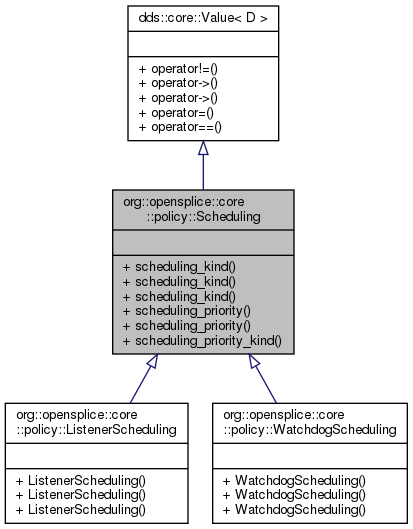 |
OpenSplice ISO C++ 2 DCPS
v6.x
ISO C++ 2 OpenSplice Data Distribution Service Data-Centric Publish-Subscribe API
|
 |
OpenSplice ISO C++ 2 DCPS
v6.x
ISO C++ 2 OpenSplice Data Distribution Service Data-Centric Publish-Subscribe API
|
QoS Policy base class for scheduling policies. More...
#include "ProprietaryApi.hpp"

Public Member Functions | |
| bool | operator!= (const Value &other) const |
| D * | operator-> () |
| const D * | operator-> () const |
| bool | operator== (const Value &other) const |
| Scheduling & | scheduling_kind (const org::opensplice::core::policy::SchedulingKind::Type &scheduling_kind) |
| org::opensplice::core::policy::SchedulingKind::Type | scheduling_kind () const |
| Scheduling & | scheduling_kind (const org::opensplice::core::policy::SchedulingPriorityKind::Type &scheduling_priority_kind) |
| Scheduling & | scheduling_priority (int32_t scheduling_priority) |
| int32_t | scheduling_priority () const |
| org::opensplice::core::policy::SchedulingPriorityKind::Type | scheduling_priority_kind () const |
QoS Policy base class for scheduling policies.
Note that some scheduling parameters may not be supported by the underlying Operating System, or that you may need special privileges to select particular settings. Refer to the documentation of your OS for more details on this subject.
Although the behaviour of the scheduling_class is highly dependent on the underlying OS, in general it can be said that when running in a Timesharing class your thread will have to yield execution to other threads of equal priority regularly. In a Realtime class your thread normally runs until completion, and can only be pre-empted by higher priority threads. Often the highest range of priorities is not accessible through a Timesharing Class.
The scheduling_priority_kind determines whether the specified scheduling_priority should be interpreted as an absolute priority, or whether it should be interpreted relative to the priority of its creator, in this case the priority of the thread that created the DomainParticipant.
Definition at line 1043 of file ProprietaryApi.hpp.
|
inherited |
|
inherited |
The operator->() is provided to be able to directly invoke functions on the delegate.
The decision to provide direct access to the delegate was motivated by the need for providing a way that was not invasive with respect to the CXXDDS API and yet would allow for vendor-specific extension. Thus vendor-specific extensions can be invoked on the Value and on all its subclasses as follows:
|
inherited |
The operator->() is provided to be able to directly invoke functions on the delegate.
The decision to provide direct access to the delegate was motivated by the need for providing a way that was not invasive with respect to the CXXDDS API and yet would allow for vendor-specific extension. Thus vendor-specific extensions can be invoked on the Value and on all its subclasses as follows:
|
inherited |
| Scheduling& org::opensplice::core::policy::Scheduling::scheduling_kind | ( | const org::opensplice::core::policy::SchedulingKind::Type & | scheduling_kind | ) |
Sets the scheduling kind
| scheduling_kind | the scheduling_kind |
| org::opensplice::core::policy::SchedulingKind::Type org::opensplice::core::policy::Scheduling::scheduling_kind | ( | ) | const |
Gets the scheduling kind
| Scheduling& org::opensplice::core::policy::Scheduling::scheduling_kind | ( | const org::opensplice::core::policy::SchedulingPriorityKind::Type & | scheduling_priority_kind | ) |
Sets the scheduling priority kind
| scheduling_priority_kind | the scheduling_priority_kind |
| Scheduling& org::opensplice::core::policy::Scheduling::scheduling_priority | ( | int32_t | scheduling_priority | ) |
Sets the scheduling priority
| scheduling_priority | the scheduling_priority |
| int32_t org::opensplice::core::policy::Scheduling::scheduling_priority | ( | ) | const |
Gets the scheduling priority
| org::opensplice::core::policy::SchedulingPriorityKind::Type org::opensplice::core::policy::Scheduling::scheduling_priority_kind | ( | ) | const |
Gets the scheduling priority kind